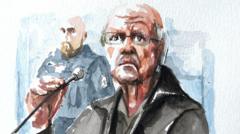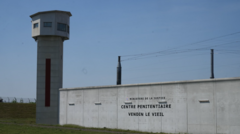Singapore enforces some of the world's toughest drug laws. Those caught with narcotics, even in small amounts, face severe penalties possibly including long prison sentences. Compulsory rehabilitation centers, like the Drug Rehabilitation Centre, aim to deter drug use through incarceration rather than treatment, reflecting a complex relationship with addiction and punishment.
Singapore's Harsh Drug Policy: A Glimpse Inside Compulsory Rehabilitation

Singapore's Harsh Drug Policy: A Glimpse Inside Compulsory Rehabilitation
A deeper look into Singapore's stringent drug laws and the experiences of those caught in the cycle of drug use and rehabilitation.
In Singapore, drug regulations need to be taken seriously, as evidenced by Kim's story. Struggling with cannabis use, she never anticipated that her act of buying weed for friends would label her as a drug trafficker when a friend got caught. The consequences in Singapore are severe; possessing even 15 grams of certain drugs can result in being presumed a trafficker, and 500 grams of cannabis can incur the death penalty. For Kim, this meant life-altering charges and an uncertain future.
While the state offers mandatory rehabilitation, it takes place in a stark environment that can resemble incarceration more than recovery. The Drug Rehabilitation Centre (DRC) houses men in overcrowded conditions and subjects them to psychological courses aiming to help them stay away from drugs. The approach remains punitive, leaving inmates with no option to recover in a traditional rehabilitative environment.
The Singapore government maintains a strict zero-tolerance policy toward drugs, which has not always translated into effective treatment for individuals battling addiction. Dr. Muni Winslow points out that the effectiveness of treatment is not contingent upon whether it's voluntary, suggesting the system has undergone positive changes, although many still suffer from the ramifications of mandatory detention.
However, critics argue that this policy of intensive scrutiny and societal stigma often inflicts more harm than the drugs themselves, claiming it fails to confront the root causes of addiction. A member of the Transformative Justice Collective noted that the system focuses more on shame rather than addressing why users turn to drugs in the first place.
As Kim awaits her judgment, surrounded by a system designed to deter drug use with fear and punishment, she mourns the life she may soon lose. With around half of Singapore's incarcerated population serving time for drug offenses, Kim's situation exemplifies the harsh reality faced by many in the city-state under its infamous drug policies. In Singapore, the prospect of redemption is tied intricately to a rigorous, unforgiving regimen that sees drug use not just as a health issue but as a criminal one, with little room for compassion.
While the state offers mandatory rehabilitation, it takes place in a stark environment that can resemble incarceration more than recovery. The Drug Rehabilitation Centre (DRC) houses men in overcrowded conditions and subjects them to psychological courses aiming to help them stay away from drugs. The approach remains punitive, leaving inmates with no option to recover in a traditional rehabilitative environment.
The Singapore government maintains a strict zero-tolerance policy toward drugs, which has not always translated into effective treatment for individuals battling addiction. Dr. Muni Winslow points out that the effectiveness of treatment is not contingent upon whether it's voluntary, suggesting the system has undergone positive changes, although many still suffer from the ramifications of mandatory detention.
However, critics argue that this policy of intensive scrutiny and societal stigma often inflicts more harm than the drugs themselves, claiming it fails to confront the root causes of addiction. A member of the Transformative Justice Collective noted that the system focuses more on shame rather than addressing why users turn to drugs in the first place.
As Kim awaits her judgment, surrounded by a system designed to deter drug use with fear and punishment, she mourns the life she may soon lose. With around half of Singapore's incarcerated population serving time for drug offenses, Kim's situation exemplifies the harsh reality faced by many in the city-state under its infamous drug policies. In Singapore, the prospect of redemption is tied intricately to a rigorous, unforgiving regimen that sees drug use not just as a health issue but as a criminal one, with little room for compassion.




















